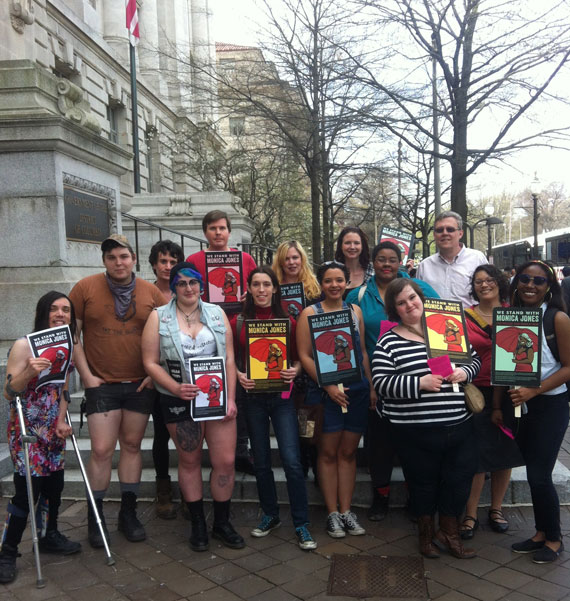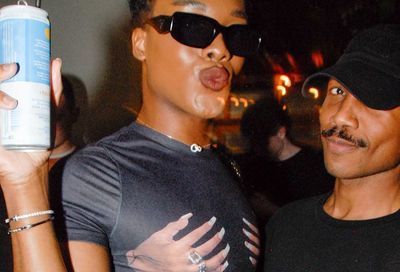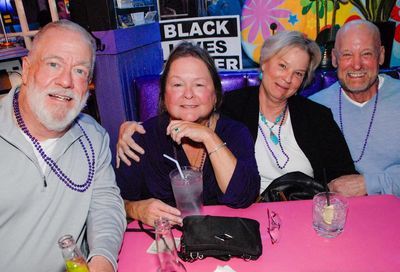Groups Rally Against PFZs
Transgender activists, sex-worker advocates gather at Wilson Building to blast D.C.'s prostitution-free zones
About 20 community activists and advocates rallied Friday outside the John A. Wilson Building, which houses the mayor’s office and the D.C. Council chambers, to call for the repeal of ”prostitution-free zones” (PFZs), which opponents say has led to profiling and harassment of transgender people, particularly transgender women of color.
The April 11 rally, organized by the local service organization HIPS (Helping Individual Prostitutes Survive) was held with the dual purpose of calling for a repeal of PFZs, as well as standing in solidarity with Monica Jones, a transgender woman and sex-worker advocate in Phoenix, who was arrested for ”manifestation of prostitution” under a police sting operation and anti-prostitution diversion program known as Project ROSE (Reaching Out on Sexual Exploitation) one day after she spoke at a rally protesting the program. Jones, who has said she was not engaging in prostitution at the time of her arrest, was slated to appear in Phoenix Municipal Court Friday and plead not guilty to the charges against her. Simultaneously, demonstrations similar to the one in D.C. were scheduled to occur outside the courthouse in Phoenix and elsewhere.

HIPS rally against ”prostitution-free zones”
(Photo by John Riley)
Outside the Wilson Building, demonstrators, including representatives from some prominent LGBT groups, held signs calling attention to the Jones case and offered fliers arguing against programs such as Project ROSE and D.C.’s PFZs. The demonstrators also engaged passerby in conversation, urging D.C. residents to contact their councilmembers to ask them to repeal the PFZs.
”We’re just trying to encourage D.C. voters to contact their councilmembers and let them know that they think prostitution-free zones are a bad law that needs to be removed from the books,” said Emily Hammell, director of development at HIPS. ”It’s used to profile trans women of color, and it’s also probably unconstitutional.”
D.C.’s PFZ provision, introduced nine years ago, allows the chief of the Metropolitan Police Department (MPD) to declare a particular area a ”prostitution-free zone,” which then grants police authority to order groups of two or more people in a PFZ to disperse. It also lowers the bar for probable cause leading to an arrest. Such zones can be labeled prostitution-free for any length of time, at the discretion of the chief of police.
At a January 2012 hearing regarding a failed bill, proposed by Councilmember Yvette Alexander (D-Ward 7), that would have expanded and made permanent existing prostitution-free zones, MPD Assistant Police Chief Peter J. Newsham testified that the purpose of PFZs is not to make arrests for prostitution, but to act as a tool that MPD officers can use to disperse people whom they believe may be trying to engage in commercial sex work. Following that hearing, as a result of outcry from critics and the logistics of enforcing PFZs, MPD halted its implementation and said it was working internally to rescind its general PFZ order.
Both transgender-rights advocates, who decry what they see as police profiling of transgender women of color, and sex-worker advocates, who seek to provide support and assistance to those who put themselves at risk in the commercial sex trade, oppose PFZs, arguing that the creation of PFZs doesn’t affect root causes of prostitution. Rather, they argue, PFZs push such activity further underground, increasing the risk of harm to sex workers.
Furthermore, opponents of PFZs also note that the provision’s legal foundation is shaky. During the debate over the bill to make PFZs permanent, Ariel Levinson-Waldman, a spokesman for the office of D.C. Attorney General Irvin Nathan, testified before the Council that the attorney general believes PFZs may be unconstitutional.
Elizabeth Saracco, director of programs at HIPS, says repeal advocates are considering a court challenge if the D.C. Council fails to take the law off the books.
”Ultimately, we just need to work together to make a happier, healthier community for everyone to live in, rather than attack individuals in the community,” says Saracco.
”MPD definitely wants to build a relationship with transgender individuals in Washington, D.C.,” she says. ”I think they want the same thing HIPS wants, in a way: just a happy, healthy community where people can live peacefully. We’ve been in talks with them to repeal the prostitution-free zones, because in nine years it hasn’t done anything useful. It hasn’t put an end to prostitution, it hasn’t bettered people’s lives in any way.”
Councilmember David Grosso (I-At Large), a critic of PFZs who was skeptical of their practicality during his 2012 Council run, has co-introduced a bill with Councilmembers Mary Cheh (D-Ward 3) and David Catania (I-At Large) to repeal PFZs. The bill has since been co-sponsored by Councilmembers Tommy Wells (D-Ward 6), the chair of the Judiciary and Public Safety Committee that the bill must pass to receive a vote by the full Council, and Marion Barry (D-Ward 8). Grosso was the only Councilmember to appear in person at the rally.
”I think it was a bad idea to start with,” Grosso said of the creation of PFZs. ”I think people recognize now that it’s an easy way to violate someone’s human rights, and it’s time to get rid of them and get them off the books.”
Grosso told Metro Weekly he believes he’ll get the seven votes necessary to repeal PFZs, noting that as more is learned about the practice, some Councilmembers, even those who supported making the zones permanent, have changed their minds.
”When I came into office, I said that I was going to have a human rights framework to establish all my policies with, and this is one more opportunity for me to do that,” Grosso said. ”In fact, I think all of my colleagues are catching on to that now, recognizing that we can’t legislate without recognizing that people are affected by the laws that we create in ways that sometimes discriminate.”
Grosso added that he expected some residents in certain areas of the city to oppose the repeal, but insisted it was the right thing to do.
”I’ve been in neighborhoods we’re they’ve touted these as something that’s effective and useful, and they’re just wrong,” he said. ”And so, what you do, as a leader in this city, in my opinion, is you stand up and you say to the community, ‘Hey, this is not working right, it’s really discriminatory, and they need to be repealed.’ So there are going to be some neighborhoods who push back, but, in the end, it’s our job to say to them that they’re not right.”
Kayley Whalen, the National Gay and Lesbian Task Force’s executive office board liaison at, also attended the rally, as did representatives from the National Center for Transgender Equality (NCTE) and the Gay and Lesbian Activists Alliance (GLAA), a local nonpartisan LGBT political advocacy group.
”I came here today because I believe that trans women of color should feel safe walking down the streets of their neighborhoods, both in D.C. and in Phoenix, Arizona, where Monica Jones was arrested,” Whalen said. ”I firmly believe that we need to stand up against police profiling and harassment and criminalization of trans women for sex work.”
Whalen said the Task Force found in its National Transgender Discrimination Survey that profiling is particularly hard on transgender women of color, with 41 percent of African-American transgender women and 25 percent of transgender Latinas reporting police harassment, or being arrested and detained due to gender-based profiling. Whalen said that PFZs simply give police ”extra leverage” to profile or harass transgender women they suspect of engaging in sex work.
”What we need instead of programs like Project ROSE that ‘save trans women from themselves,’ is we need programs developed for and by trans women that help empower them,” Whalen said. ”We need to support organizations like Casa Ruby DC; the TransLife Center, of Chicago House; or the Sylvia Rivera Law Project, that are working directly to empower trans women of color to take control of their destiny and their own advancement in society.”
GLAA members have testified before the D.C. Council that PFZs do not withstand constitutional scrutiny, an argument also backed by groups such as the American Civil Liberties Union. On April 3, GLAA sent letters to the five members of the Council’s Committee on the Judiciary and Public Safety, as well as to Council Chairman Phil Mendelson (D) and Grosso, outlining the constitutional concerns with PFZs.
”Even though the Council is a legislature, and you would think legislators would be eager to legislate, there’s often a hesitance to act unless there’s no other alternative,” GLAA President Richard Rosendall said of the Council’s inaction. ”In this case, we and our allies, including the ACLU, made the case during the hearing on Yvette Alexander’s permanent PFZ bill in 2012, we made the case that it was unconstitutional, it didn’t work, and caused a lot more problems than it solved. And then police officials indicated that they would stop using them, apparently until this got resolved. But then there was an admission that they weren’t using the PFZs to make arrests, but just to make people move on. One of the reasons they weren’t doing arrests was it wouldn’t hold up in court.”
Rosendall said profiling within PFZs happens ”routinely and egregiously” to transgender women of color, even when they are not engaging in prostitution. He added that non-transgender people, both within the LGBT and straight ”ally” communities, need to speak out in favor of repealing PFZs, rather than dismiss the issue because it doesn’t directly affect them.
”Those of us who don’t fit the profile need to step up for our trans sisters, and the Council needs to get this passed,” Rosendall said. ”It’s unconstitutional, and it’s not solving any problem. I think our legislators have a responsibility to at least do no harm. In this case, the laws against prostitution are used to target a particular population, many of whom have been driven into sex work because of discrimination. Adding an arrest to their record solves nothing and only increases the burden on them, creating a vicious cycle.”
Rosendall urged the Council to act this year. Mayor Vincent Gray, who is supportive of repealing PFZs, was recently defeated in his re-election bid, fueling a sense of urgency.
Of the 13 members of the D.C. Council, five back the bill to repeal PFZs. Finding two more votes may be a challenge, as many of the remaining councilmembers have appeared supportive or sympathetic to keeping PFZs in place.
The 2012 permanent PFZ bill was co-introduced by Alexander, Barry, former Councilmember Harry Thomas Jr. (D-Ward 5), former Council Chairman Kwame Brown (D), Councilmember Vincent Orange (D-At Large) and Councilmember Muriel Bowser (D-Ward 4), the Democratic nominee and presumptive favorite to become the District’s next mayor. It was co-sponsored by Councilmembers Jack Evans (D-Ward 2) and Catania, although Catania later withdrew his support of the measure.
Council Chairman Phil Mendelson (D) helped defeat the 2012 bill in committee, largely over constitutional concerns, but told The Washington Post in 2012 that he thought PFZs were useful in disrupting the sex trade. Councilmember Jim Graham’s position on repealing PFZs is unknown, although Graham did introduce a bill in 2009 aimed at creating ”no loitering zones,” similar to PFZs and ”drug-free zones.” Graham later withdrew the bill.
Councilmember Kenyan McDuffie (D-Ward 5) expressed concerns about profiling and the constitutionality of ”permanent” PFZs during his 2012 special-election victory, saying that if the District is going to establish PFZs, they need to be able to withstand potential court challenges. Councilmember Anita Bonds (D-At Large) had not yet been elected to the Council at the time the permanent PFZ bill was considered.
Support Metro Weekly’s Journalism
These are challenging times for news organizations. And yet it’s crucial we stay active and provide vital resources and information to both our local readers and the world. So won’t you please take a moment and consider supporting Metro Weekly with a membership? For as little as $5 a month, you can help ensure Metro Weekly magazine and MetroWeekly.com remain free, viable resources as we provide the best, most diverse, culturally-resonant LGBTQ coverage in both the D.C. region and around the world. Memberships come with exclusive perks and discounts, your own personal digital delivery of each week’s magazine (and an archive), access to our Member's Lounge when it launches this fall, and exclusive members-only items like Metro Weekly Membership Mugs and Tote Bags! Check out all our membership levels here and please join us today!























